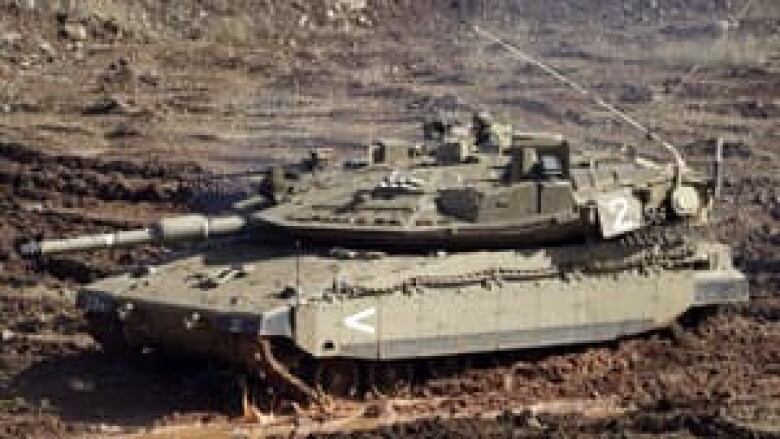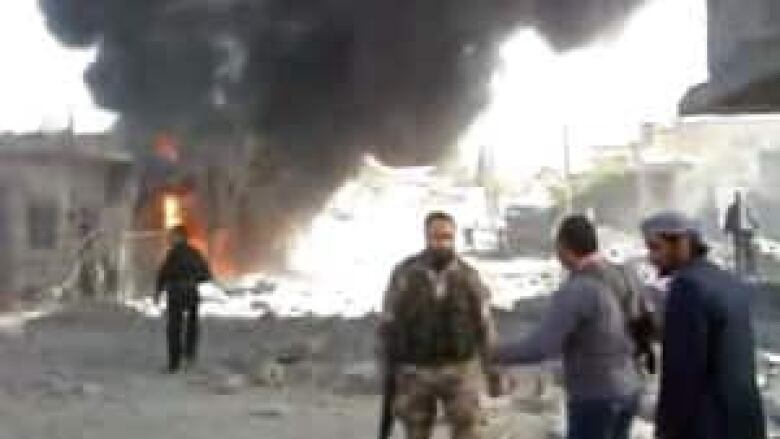Israel hits Syrian targets after stray mortar fire
Syrian fighter jet bombs rebel-held area near Turkish border
An Israeli tank scored a "direct hit" Monday on a Syrian armoured vehicle after a mortar shell landed on Israeli-held territory, the military said, in the first direct confrontation between the countries since the Syrian uprising broke out.
This comes as a Syrian fighter jet bombed a rebel-held area near the Turkish border on Monday, killing more than a dozen people, while a rocket-propelled grenade landed in Turkey, officials and witnesses said.
The incidents raised fears that Syria's neighbours could be dragged into its ongoing conflict.
"We are closely monitoring what is happening and will respond appropriately," Prime Minister Benjamin Netanyahu said Monday in a speech to foreign ambassadors. "We will not allow our borders to be violated or our citizens to be fired upon."
Israel has steadfastly tried to avoid getting sucked in, but it has grown increasingly worried after a series of stray mortar shells have struck territory in the Israeli-controlled Golan Heights.
Israeli military officials say they believe the mortar fire is spillover from intense fighting near the frontier between Syrian President Bashar Assad's army and rebel forces trying to oust him, and not an overt attempt to hit the Jewish state.
Tanks targeted 'source of fire' in Syria
But on Monday, a senior Israeli official said Israel is starting to question that assessment.

"We thought it was spillover, but today we're not sure," said the official, speaking on condition of anonymity because the issue is still being debated among intelligence commanders.
Israeli officials have long feared that the embattled Assad might try to draw Israel into the fighting in an act of desperation.
In a statement, the military said Israeli tanks targeted the "source of fire" in Syria after the mortar shell landed in an open area of the Golan Heights. It confirmed "direct hits" on the targets.
Israeli military officials, speaking on condition of anonymity under army guidelines, said an armoured vehicle carrying "Syrian mobile artillery" was hit. There was no immediate word on casualties on the Syrian side, but Israeli officials said the vehicle was believed to belong to the Syrian government.
Monday's incident occurred in an area called Tel Hazeka, in the central Golan Heights near the Syrian frontier.
The Syrian Observatory, a Britain-based group that relies on a network of activists on the ground in Syria, said three rebel fighters were killed Monday in clashes with the Syrian army in Bir Ajam, a nearby village.

Rami Abdul-Rahman, the head of the Britain-based group, said rebels belonging to an Islamist group attacked several Syrian military checkpoints and that government forces fought back for control of the area.
The state-run news agency SANA has not commented on the fighting in the area or on the clash with Israel.
While Israel appeared eager to calm the situation, its response was a potent reminder of how easily the Syrian civil war — already spilling across borders with Turkey, Lebanon and Jordan — could explode into a wider regional conflagration.
Fatal Syrian bombing near Turkish border
On Monday, a Syrian fighter jet bombed a rebel-held area near the Turkish frontier three times, killing more than a dozen people in the town of Ras al-Ayn, a Turkish official said on condition of anonymity because he was not authorized to brief the media.
The official said close to 70 people were brought to Turkey for treatment, where eight more of them died.

Turkish Foreign Minister Ahmet Davutoglu, speaking to reporters in Rome, said Ankara had formally protested the bombings close to the border, saying the attacks were endangering Turkey's security, state-run TRT television reported. He said Turkey had also reported the incident to NATO allies and to the United Nations Security Council.
The Syrian jet had not crossed the border into Turkey, he said, adding that Turkey would have responded if it had. He did not elaborate.
In recent months, shells fired from Syria have landed on Turkish territory, prompting Turkey's military to retaliate in kind.
Last week, the rebels overran three security compounds in Ras al-Ayn, located in the predominantly Kurdish oil-producing northeastern province of al-Hasaka, wresting control from the regime forces.
Rocket-propelled grenade lands in Turkey
Hours later, a Syrian helicopter was seen flying over Ras al-Ayn, prompting rebels to fire on it with machine-guns. The helicopter returned fire but it was not clear if there were any casualties.
Earlier Monday, a rocket-propelled grenade round landed on an empty field near Ceylanpinar. No one was injured, the official said. Turkey has been responding with fire to shells and mortars fired from Syria that land on its territory, but there was no immediate Turkish retaliation, according to the official.
The force of the blast from the aerial bombing shattered windows in Ceylanpinar, in southeastern Turkey, the official said. A few people were injured in Ceylanpinar, mostly from broken glass and shrapnel. The private Dogan news agency said a Turkish soldier guarding the border area was also hurt.
The violence in Syria has killed more than 36,000 people since an uprising against President Bashar al-Assad's regime began in March 2011. Hundreds of thousands have fled the fighting into neighbouring Turkey, Jordan, Lebanon and Iraq.
A surge of 11,000 more Syrians escaped into Turkey on Friday following the fighting at Ras al-Ayn.
Gulf council recognizes official opposition
The six-nation Gulf Cooperation Council recognized the new broad-based Syrian opposition group Monday as the legitimate representatives of the Syrian people, the first formal endorsement of the opposition group that seeks to topple President Bashar Assad.
Syrian anti-government groups struck a deal Sunday after more than a week of meetings in Qatar. They were under intense international pressure to form a new opposition leadership that will include representatives from the country's disparate factions fighting to topple Assad's regime. The deal is backed by the U.S. and other Western countries.
In its statement, the GCC said it will offer "support and endorsement to this entity to realize the aspirations and hopes of the Syrian people." The council said it hoped the new body will be a step toward quick political transfer of power and put an end to the bloodshed. It called for Arab and international recognition of the Syrian National Coalition for Opposition and Revolutionary Forces, the new body.
The GCC is made up of Kuwait, Bahrain, Saudi Arabia, Qatar, Oman and the United Arab Emirates.
